THIS: The New, Weird America
By:
May 16, 2016
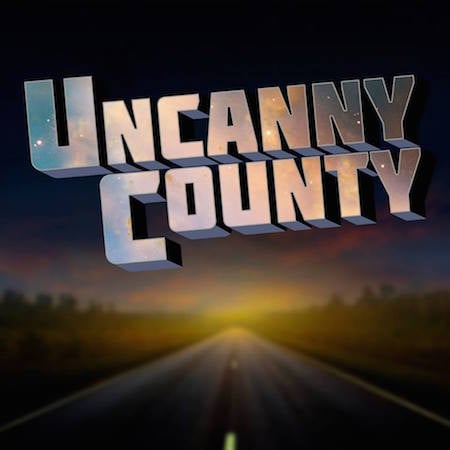
The past, they say, is a foreign country — but the supernatural, it turns out, is just over to the next county. Uncanny County, that is; a crossroads of backwoods and roadside daily reality with metaphysical phenomena and post-meta storytelling. It’s also the title of a podcast that seems beamed from the golden age of broadcast radio in remote cabins and shadowy storefronts to the screens and earbuds of the 21st century’s stripmall landscape and scattered subcultures. There are dark corners left in this vast land, and shadows still cast from steps taken in the past — and Uncanny County uncovers them and finds what’s funny about lost souls, neighborhood hellspawns, interdimensional horror-clowns, robot takeovers and other pastimes of the overactive American imagination. Four monthly episodes in, “A Thing for Machines” is a tale of tech coming to a small hamlet that feels like Thornton Wilder colliding with Karel Capek or C. L. Moore; “Eleventh Hour”’s chronicle of life-after-damnation is like a downhome Wings of Desire or a kind of beer-bottle-imp fable; “Mother Loves You” is latter-day Tales from the Crypt with suburban developments scarier than sepulchers; and “Coulrophobia” piles on scary-clown jokes so nonstop they may just be undying. Uncanny County is the kind of place I was born to be far away from, and listen to dispatches from every month — so I sat around the google-hangouts campfire with co-creators Alison Crane (speaking from New York City) and Todd Faulkner (detoured briefly to Central PA) to help get to know the territory…
HILOBROW: Was your attraction to supernatural themes a lifelong pattern or a more recent fixation?
CRANE: Todd has a wealth of knowledge about horror movies that I don’t have, and I sort of come from a place of The X-Files and Twin Peaks, but where there’s a Venn diagram of those two genres, that’s sort of where Uncanny County lives, wouldn’t you say?
FAULKNER: I think so; we both grew up in Oklahoma, several years apart, but there’s something about Oklahoma, and the Midwest, the prairie states in particular. I don’t know if it’s just the history of the way people went out there and got free land and were very self-sufficient and not trusting of other people, but there’s a certain level… there’s a lot of religion, and a lot of faith, and a lot of paranoia, and there’s a lot of fear. And something about those things, and the way they mix, to me, I think is what led me, younger, down this path; I used to be obsessed with all the, “In Search of…Bigfoot,” the old Nimoy show In Search of…; I would go and watch any documentary about mysterious things, every weekend at my local little cinema — and it just never went away. But in writing I kind of took a left turn and did very traditional stuff for many years, but then Alison and I started working together — and although we grew up in Oklahoma and know many of the same people, we didn’t meet until we were here in New York and introduced by a mutual friend from Minnesota [laughs].
CRANE: Very weird, because we met up here, and I was in a play with our mutual friend, and I was looking for a Doctor Who ringtone, and our friend said, “Oh, my friend Todd has a Doctor Who ringtone, I’ll hook you up on Facebook.” He came to see my first show that I wrote, which was in the New York Fringe, and then after that we just kind of talked more and realized that we had really similar sensibilities; we tended to like a lot of the same stuff. My writing tends toward magical realism…
FAULKNER: Alison organized a project where we were doing one-act plays, related to roadside attractions. And in doing that, we realized that two out of three of the pieces were supernatural — and I realized that the one I came up with initially certainly could have been. And this all kind of evolved and morphed into, this, through a bunch of creative people that Alison gathered together; I was lucky to be included in that.
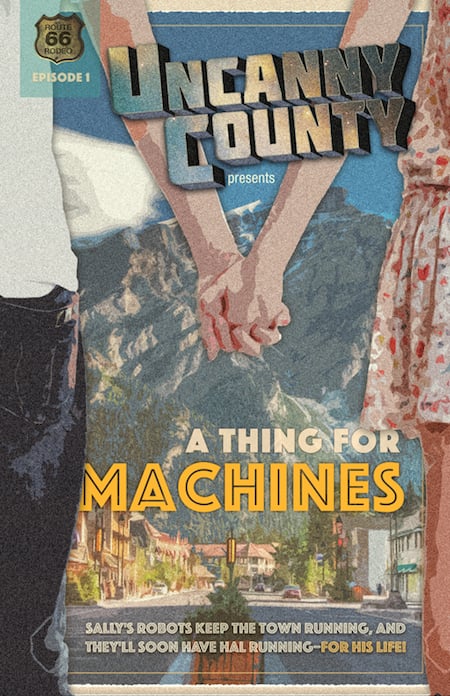
CRANE: We realized that we also share — and this is probably from growing up in Oklahoma, along the old Route 66 — that we have this passion for Americana, and the weirdness and the quirkiness and the kitsch, and also that there is a magic, and a mysteriousness to it. It’s also because that’s sort of dying out, that it holds a fascination, for me at least, and I think Todd too, which is why Uncanny County is infused with that as well.
FAULKNER: Absolutely. I think it is going away, [but there’s] a certain level of mysticism at the fringes; you wouldn’t be that surprised to see Bigfoot in your backyard; at least when you’re a kid growing up there in the ‘70s.
CRANE: It’s a super-weird place; there’s this religion, and this superstition, and also you’ve got this — the land itself is really kind of crazy, because you have all of this insane weather; you’ve got tornados coming in one direction, huge thunderstorms, and you have droughts…and now they have earthquakes!
FAULKNER: And the history of all the various Native American tribes who were pushed there before their land was taken away again…
CRANE: Outlaws hiding out in the Wichita Mountains, Bonnie and Clyde, there’s just a lot of history, weird history…
FAULKNER: And when we say “weird” we don’t mean it disparagingly; one thing that’s been important to us especially, when we’re setting these things in and around Oklahoma — or just kind of that area, it’s not necessarily Oklahoma — but, we don’t mean it disparagingly, it’s…
CRANE: …It’s complimentary! [laughs]
FAULKNER: It is! We love these characters and we love these people; it’s where we’re from, it’s our people. We’re certainly not meaning to mock. We’re embracing the weird that we both come from.
HILOBROW: That very much comes through, and I’m the kind of person to whom “weird” is not a pejorative. It’s interesting that you’re thinking of your home region in particular, because I did like the way that this fictional county is like a nexus point of so many different habitats, from Norman Rockwell village in “A Thing for Machines” to suburban limbo in “Mother Loves You”…
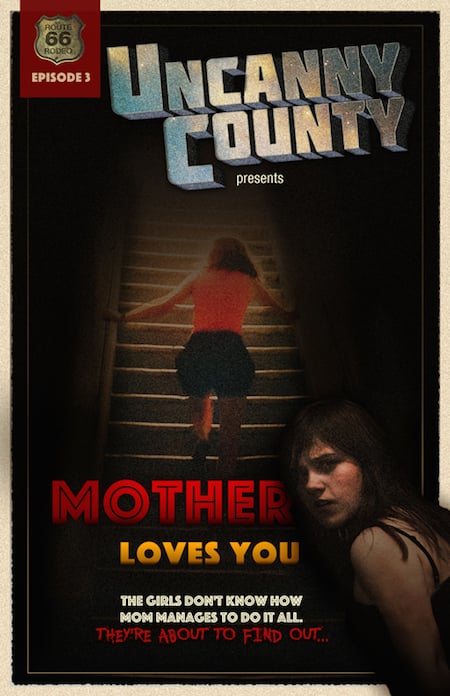
FAULKNER: When we were setting up this world, we kind of came up with this idea that it’s everywhere and it’s nowhere. It’s kinda that place where things go a little weird and you’re off the map and you’re not quite in reality…but Uncanny County can be anywhere in the country…I guess it could be anywhere in the world, but we haven’t really gotten that far yet. I’m in Pennsylvania right now, I’m in Central PA, which, I don’t know if you saw, there was a graphic going around recently talking about the “9 real states,” or the “13 real states,” but it was talking about how all the areas are divided, by culture and by the people who settled them…
CRANE: Eleven, eleven! [The “11 American Nations,” as seen here.]
FAULKNER: Eleven, right. And the thing is, Central PA, where I am, is in this big path, which cuts this swath right through there, and all the way down through Oklahoma. And the people here are very similar.
CRANE: “Greater Appalachia” is what they call it, and it’s as if the United States was based on who settled there and how culture kept getting passed down, and the attitudes that are there, [so] you have the people in Greater Appalachia who are like, very distrustful, and paranoid, and they want the government to stay out of everything, ’cuz, the Scots people who settled there, they had been in a constant state of war for 200 hundred years, so you’re just like —
FAULKNER: And here there’s the “Pennsylvania Dutch” and you see the witchery symbols that are all over the barns —
HILOBROW: Yeah, the hexes —
FAULKNER: — and there’s a similar superstition mingled with all this stuff; it’s fascinating, again, to learn the similarities these different regions share.
HILOBROW: There is a humaneness and a sympathy in these four episodes that I’ve heard so far — after all, Iowa had gay marriage before New York did, so there are things about the middle of the country that are very counter to stereotype.
FAULKNER: I think that’s right; I think it’s dangerous to paint anyone with a very narrow brush; there’s more to everyone’s story than we will ever know. Most of the conflict in this country, and of all time, is fear of the other, of the unknown. Ultimately, that’s the fear of what’s inside you; you know what you might be capable of, so you assume that [is in] everyone else…that darkness that is always out there surrounding us, but that we fear is also inside.
HILOBROW: We spoke earlier about cultures that are dying out, and I’m fascinated that the very format of this show is an archaic one, like, “Mercury Theatre on the Web”…
FAULKNER: In recent weeks we’ve really connected with some other [online radio] shows — it’s still kind of…new, again, if that makes sense? It really feels like we’re entering an age where this is a new thing and more and more people are doing it. There’s Wooden Overcoats, a British sitcom, basically, and of course there’s Night Vale, which is very unconventional storytelling… there’s also other great horror stuff out there; there’s another one takes place in Oklahoma, turn-of-the-century! [PleasureTown, about a fictional, failed utopian experiment.] This all started from theatre — Alison’s idea of doing the one-acts — and we realized, we can make theater-to-go now.
CRANE: Actually it was our executive producer, Jessica Walker — also from Oklahoma, was my best friend in the second grade — she originally suggested we do this as a podcast. It was a way to get our work to a wider audience than having a reading of some one-acts in the basement of a bar; we could actually get it out there.
FAULKNER: Or spending $10,000 on a Fringe show that 200 people see. I mean, yours got more than that [laughter], you got great houses…but it’s a lot of work!
CRANE: Not that this isn’t a lot of work, but more cost-effective than doing a web series….
FAULKNER: And with audio, you can do anything; if you’re creative enough in the writing, you can go anywhere, do anything—
CRANE: — You can have a giant octopus, you can have thousands of tiny clowns —
FAULKNER: Though I kicked myself for writing that when I was in postproduction, and had to make the sounds of thousands of tiny clowns [laughter]. The more we go on, the more we’re really learning to write for this medium; we’re not ever trying to tone down to the medium, in the sense that, we’re trying to tell stories that are big enough for any medium — they could go onstage, they could go to a fully produced web series, TV series, movie, whatever. The whole show could be two people talking, and be incredibly intense and immediate and personal, or you can have…an army of tiny clowns…hilarious, disgustingly gross hijinks.
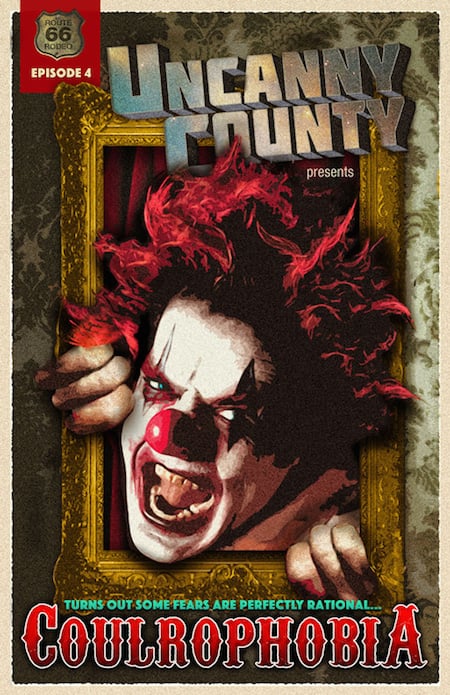
HILOBROW: More often than not, when I listen to a show like A Prairie Home Companion, I’m picturing three people standing up at mics on a theatre stage, whereas, when I hear all of your episodes, I’m picturing robot villages and giant clown-heads. The sensory cues you’ve written in to bring this to life are very vivid.
FAULKNER: We’re always looking for ways to expand that even further; Alison’s working on a piece with music, where the character is a musician and it figures in.
CRANE: It’s not a musical, but the music is integral to the plot, so we have musicians who are collaborating on it. That’s the other thing about doing an anthology podcast as opposed to a serialized podcast; we’re not limited by a particular storyline. If somebody’s like, I want to write a musical episode, or want the world to end, the world can end, without disrupting the continuity of the show. It gives us a lot of freedom that we wouldn’t necessarily have if we were trying to carry through a specific storyline. Though you will notice, occasionally, a character might show up again in a totally different situation or context — you’ve heard Sheriff Roland in a couple of episodes.
FAULKNER: Whatever follows the dictates of the story. If Sheriff Roland is in the episode and the world ends, then Sheriff Roland dies along with everybody else — she may be back in the next episode; doesn’t matter — alternate realities, millions of possibilities!
HILOBROW: So, it seems as if your affinity for weirdness came after you grew up in a place like Oklahoma rather than just having been geeks for Twilight Zone-ish stuff to begin with, is that accurate?
CRANE: Yeah.
FAULKNER: I’ve been a geek from day one. [laughter]
CRANE: I do think, this is something I’ve noticed about people who grew up in Oklahoma, and then chose to make their life somewhere else — and other Oklahoma expats have commented on this to me — there is a very specific, strange, straightness of mind to people who have grown up in this very conservative, very religious — I don’t like saying “paranoid” cause it sounds disparaging — but this very conservative, religious part of the country, and then moved somewhere like New York where anything goes, where you see every kind of person, every nationality, every kind of lifestyle, and it’s just like, basically you’ve lived at both ends of the spectrum, and it does a little something to your mind. Something about growing up in Oklahoma, and moving somewhere else, that gives you a mind that’s open to extreme possibilities [laughs].
FAULKNER: I will say, I find that more true of those of us on…the liberal side of the spectrum. Because I know several people who have moved here from Oklahoma, and it is really a career thing, and they very much bring that with them, and that serves them well; it’s who they are, and they embrace that. When you embrace your roots, we find as actors and writers, it’s very good for us, because that’s the story we’re telling. To me, I always feel like, growing up in Oklahoma, one of the reasons I was always drawn to UFOs, and Chariots of the Gods, and Bigfoot and the Loch Ness Monster and whatever, I kinda felt like I was left behind by aliens and raised by this nice family. Because I never felt like I quite fit in there. I loved the people, I loved where I was, but I got off the plane, having moved to New York and staying with a friend and within like, an hour I was like, “Oh yeah, this is right.”
CRANE: Exactly the experience I had! I came out to audition for grad school, and within an hour, I was like, “Oh! This is what it’s supposed to feel like!” It was instant.
FAULKNER: Not that the city doesn’t also make me insane and crazy and paranoid and raging. But that’s probably just who I am. [laughter] Yeah, that’s part of it, but I think I’ve had geek culture throughout my veins my entire life. Grew up on a steady diet of comic books, and The Six Million Dollar Man, and everything.
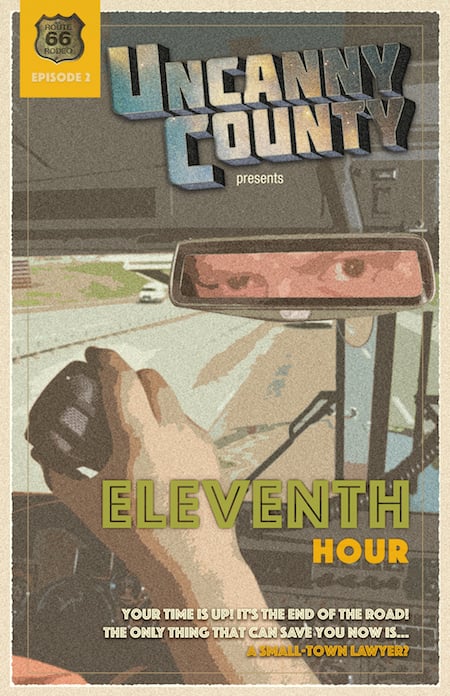
HILOBROW: From what you’ve both said before, though, it doesn’t have to have been imported through TV, ’cuz even though native northeasterners tend to think of that part of the country as pedestrian, you’re saying there was a strain of mysticism and superstition there that’s homegrown and can feed into this sense of the uncanny.
FAULKNER: It’s not in the open, it’s in the shadows, but it’s definitely there. Or at least it was growing up.
HILOBROW: Is that because of That Old-Time Religion mostly, or what other factors?
CRANE: It’s the crossroads; Oklahoma is the crossroads of America. You have these major highways that come through it, and the old, I keep bringing it up, but, the old Route 66 goes right through it, and there is something very, very magical about that — Route 66 is not logical; it’s the Mother Road of America, and so there’s something to that, that gives it a strangeness, and something that’s a little bit dated, and also, I mentioned, the environment, you have a whole lots of different landscapes; people think of it as being flat, but you have central Oklahoma which is pretty much plains, and then northeastern Oklahoma which is the Ozarks, and it’s dark, and wooded, and hills, and strange. Then we’ve got the Wichita Mountains, where they had caves and robber hideouts and things like that. So there’s a lot going on there just in terms of Americana, and American mythology.
FAULKNER: And it’s very easy there to fall off the beaten path. To turn down a dirt road and you don’t know where it goes. I don’t know where it comes from, but it’s there…there’s always just this sense of, if something weird happens, you wanna know what it as, and you wanna believe there was a reason, or something that caused it, or was destined, perhaps. It’s a weird place.
CRANE: You should visit! [laughter] But oh my gosh, I tell ya, living out here, I miss the thunderstorms so badly — because there, you have sky that just doesn’t stop, and when there are thunderstorms it is incredible — the sky is pink and purple and blue and you can see the lightning from miles away and it’s just gorgeous.
HILOBROW: So what is down the next dirt road?
FAULKNER: The first season will be 13 episodes…
HILOBROW: Was that number picked on purpose?
CRANE: It was manageable. We originally thought — [laughs loudly] that we would do an episode every two weeks… [laughs]
FAULKNER: We were young and dumb! [laughs] The undertaking is…
CRANE: A LOT of work.
HILOBROW: Oh, it was good to have the debut three-episode binge, but the month-long waits are worth it.
FAULKNER: Good! ’Cuz we have no choice.
HILOBROW: Any last words?
FAULKNER: The other great thing about being in New York and doing this here is the sheer wealth of talent — a lot of them are our friends, a lot are people we knew tangentially who we’ve gotten to know more; we lost a friend along the way who was in several of our episodes, and it’s an ever-growing family of enormously talented people, and just a joy to work with them all.
HILOBROW: Another crossroads.
CRANE & FAULKNER: Ah, yes!
MORE POSTS by ADAM McGOVERN: OFF-TOPIC (2019–2025 monthly) | textshow (2018 quarterly) | PANEL ZERO (comics-related Q&As, 2018 monthly) | THIS: (2016–2017 weekly) | PEOPLE YOU MEET IN HELL, a 5-part series about characters in McGovern’s and Paolo Leandri’s comic Nightworld | Two IDORU JONES comics by McGovern and Paolo Leandri | BOWIEOLOGY: Celebrating 50 years of Bowie | ODD ABSURDUM: How Felix invented the 21st century self | CROM YOUR ENTHUSIASM: C.L. Moore’s JIREL OF JOIRY stories | KERN YOUR ENTHUSIASM: Data 70 | HERC YOUR ENTHUSIASM: “Freedom” | KIRK YOUR ENTHUSIASM: Captain Camelot | KIRB YOUR ENTHUSIASM: Full Fathom Five | A 5-part series on Jack Kirby’s Fourth World mythos | Reviews of Annie Nocenti’s comics Katana, Catwoman, Klarion, and Green Arrow | The curated series FANCHILD | To see all of Adam’s posts, including HiLo Hero items on Lilli Carré, Judy Garland, Wally Wood, and others: CLICK HERE
